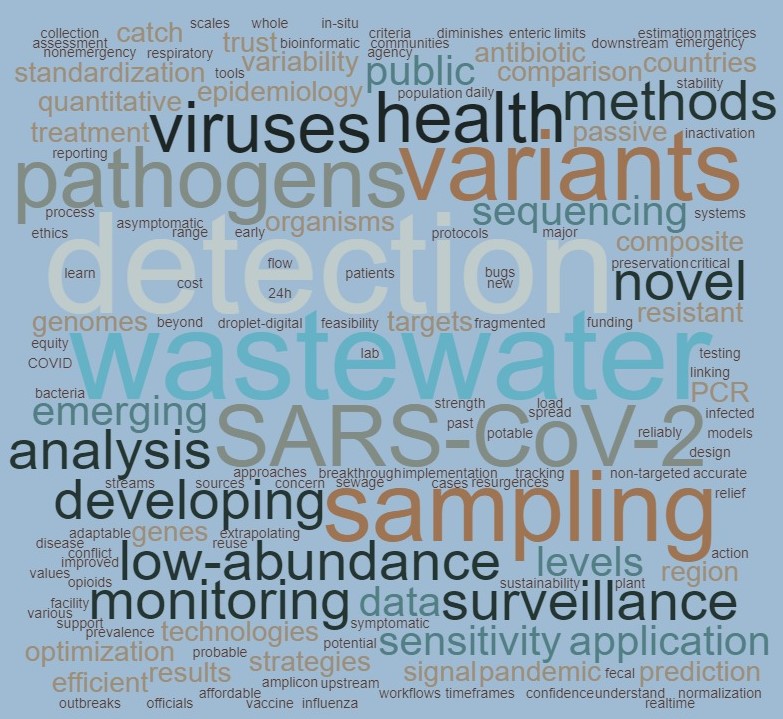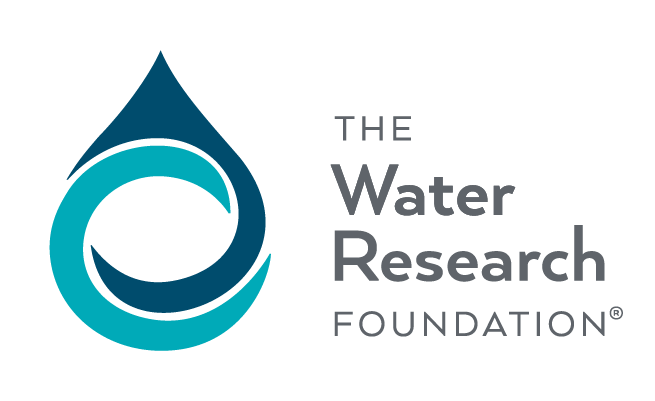November 3, 2021 at 1-3pm EDT
Click Here to access the meeting recording and slides.
The link above will direct you to The Water Research Foundation’s event page. Note that you will need to log in to your WRF account or sign up for a free WRF Public+ account to access the meeting recording.
About the Meeting:
Over the past year, researchers have worked to develop wastewater surveillance as an actionable tool for response to the COVID-19 pandemic. In this meeting, we aimed to celebrate the progress and efforts of the research community, provide a platform for presenting research updates, and highlight ongoing needs for future wastewater surveillance research and development. This meeting was hosted by The Water Research Foundation and featured a series of short lightning talks. Attendees also contributed to a crowd-sourcing wordcloud in response to the question:
What are the most critical upcoming research areas for wastewater surveillance?

Fall Meeting Lightning Talks
- Scaling SARS-CoV-2 Wastewater Concentrations to Population Estimates of Infection, Alessandro Zulli (Yale University)
- Widespread vs Sporadic: Sewage Patterns of Viruses, Cresten Mansfeldt (University of Colorado Boulder)
- Sequencing SARS-CoV-2 in Southern California Wastewater, Jason Rothman (University of California Irvine)
- Identifying thresholds for public health action: rate of change in SARS-CoV-2 wastewater and clinical surveillance results from four major metropolitan areas in the US, Mitham Al-Faliti (Howard University)
- Variability of SARS-CoV-2 in wastewater, Rachelle Beattie (UNC Chapel Hill)
- Quantification of SARS-CoV-2 Variants in Wastewater Using Droplet Digital PCR, Tara Ellison (Bio-Rad Laboratories)
- To Target or Not to Target When Sequencing SARS-CoV-2, Davida Smyth (Texas A&M University)
- Strategic Sampling Design and Adaptive Sampling for COVID-19 Wastewater Surveillance: Case Studies in South Atlanta and Emory University Campuses, Yuke Wang (Emory University)
- SARS-CoV-2 Variant Detection Through Wastewater Surveillance Prior to Clinical Detection, Devrim Kaya (Oregon State University)
- Collaborative SARS-CoV-2 Monitoring in Oklahoma Wastewater, Jason Vogel (University of Oklahoma)
- Minimum sequencing for SARS-CoV-2 variant detection, Amanda H. Sullivan (University of Georgia)
- High-resolution sampling for SARS-CoV-2 detection, Lorelay Mendoza Grijalva (Stanford University)
- Data variability in WBE for SARS-CoV-2, Rose Kantor (University of California Berkeley)
- Preventing Outbreaks with Building-Level Monitoring, Susan De Long (Colorado State University)
- Predicting variant & mutant dynamics from sewage, Vic-Fabienne Schumann (Berlin Institut for Medical Systems Biology & Max-Delbrueck Center for Molecular Medicine)
- W-SPHERE (Wastewater-SARS Public Health Environmental Response) a Global Data Center for SARS-CoV-2 detection in wastewater and environmental samples, Andri Taruna Rachmadi (Michigan State University)
- Treatment plant capability to test for COVID-19 in New York, Dustin Hill (Syracuse University)
- Thailand’s third covid-19 wave warning via sewage, Jatuwat Sangsanont (Chulalongkorn University)
- SARS-CoV-2 variant abundance estimates with dPCR, Marlene Wolfe (Emory University)
- Direct extraction for SARS-CoV-2 wastewater surveillance, Megan Lott (University of Georgia)
- Interpreting wastewater data from buildings, Scott W. Olesen (Biobot Analytics)
- Nationwide WBE in Turkey: Routine Monitoring of Covid-19, Bilge Alpaslan Kocamemi (Turkish Water Institute & Marmara University)

